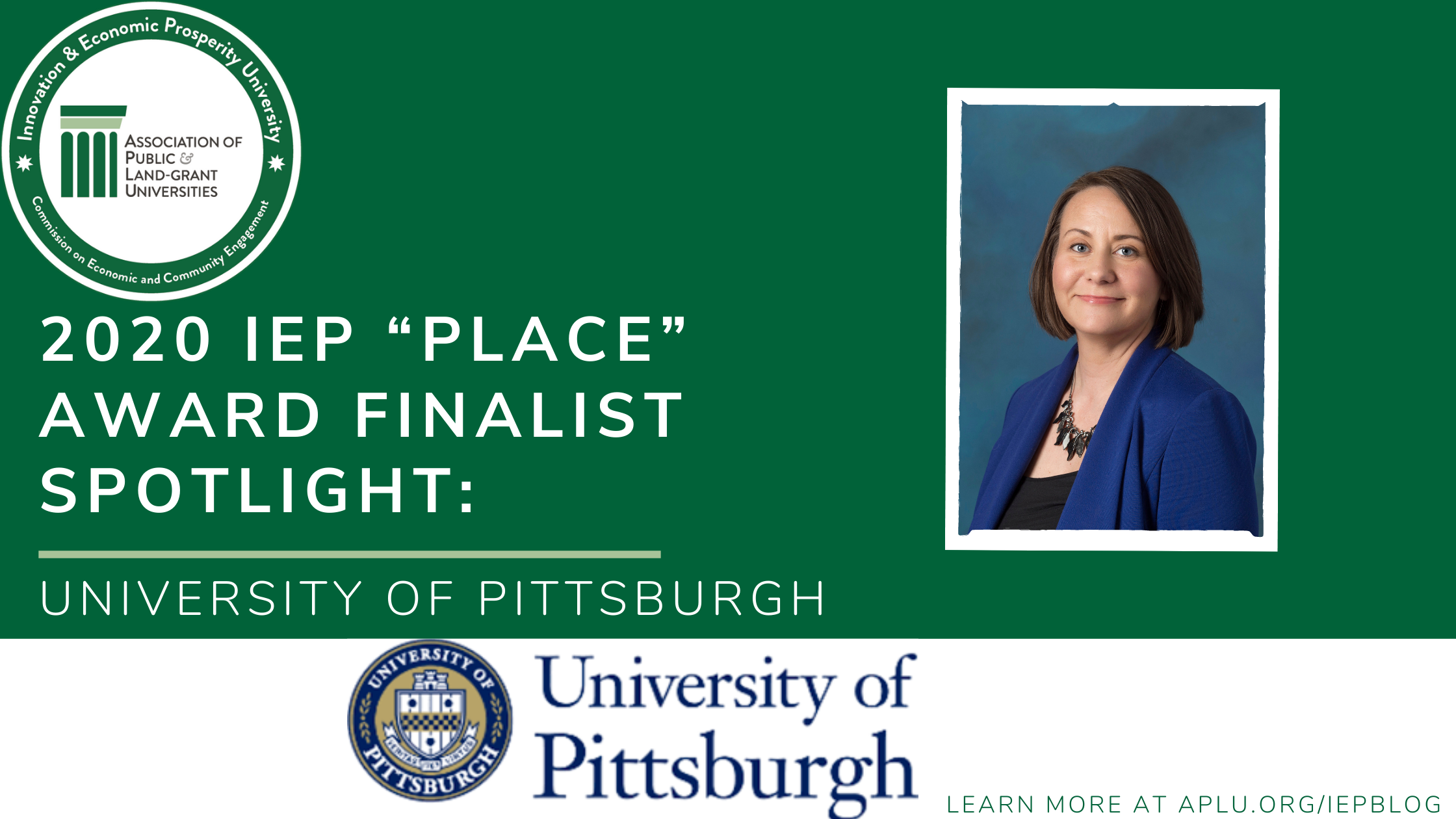2020 IEP “Place” Award Finalist Spotlight: University of Pittsburgh
By: Lina Dostilio, Associate Vice Chancellor for Community Engagement, University of Pittsburgh

This article is included as part of APLU’s Innovation and Economic Prosperity Universities Designation and Awards Perspectives Blog. Read other articles around strategies, programs, and impact of APLU’s IEP designees at www.APLU.org/IEPBlog. Earn APLU’s IEP designation. Learn more at www.APLU.org/SeekIEP.
446. Pittsburgh has 446 bridges – more than any other place in the world, even Venice. Pittsburgh is only navigable because of its bridges. This is also true, metaphorically, of the ways in which our communities grow and evolve. Between communities, there are visible disparities in social, educational and economic outcomes. To attain parity, we must forge bridges that enable community progress. The University of Pittsburgh is deeply committed to bridging our research, innovation and economic development efforts with the expertise of our community partners to help our communities thrive.
One such community is Homewood, a historic hub of African American life in Pittsburgh since the 1940s. Located about three miles from our campus, Homewood has struggled with high poverty, unemployment, and lack of investment. It also has a deeply rooted network of community-building organizations and leaders who have welcomed Pitt faculty and students as partners for many years. Recognizing an opportunity to have much greater impact, the University made a long-term institutional commitment to Homewood that marries our community engagement initiatives with economic development through mutually beneficial partnerships.
Being deeply committed to the values of public higher education and to the vitality of Pittsburgh, we must be an economically and community-engaged institution, particularly in those communities that experience the greatest disparities. The cases in our application illustrate that we can only do this by being in partnership with community leadership: those who know the strengths and assets of their communities and have a vision of progress to which we can contribute.
Pitt’s Community Engagement Center (CEC) in Homewood
The CEC in Homewood is a place for engagement innovation: a physical home for the staff who specialize in place-based engagement, a civic gathering space, and home to engagement programming ranging from STEM education to chronic disease management to small business development. Many of the CEC’s programs help to ensure that the benefits of the region’s recent economic transformation are shared more equitably in neighborhoods such as Homewood, and are informed by a careful process through which University ideas are shaped by an advisory council comprised of residents, business owners, elected officials, faith leaders and representatives of community-based organizations, resulting in sustainable partnerships.
The very development of the CEC was an exercise in place-making. Hearing community concerns about economic displacement and gentrification, the University invested in an existing community asset rather than acquiring property. The Bible Center Church had purchased an old market in the heart of the commercial district of Homewood to prevent speculative development. The University revitalized the 20,000 square foot property, restoring it as a vibrant part of the main street, while achieving a 42% MWBE contract participation rate and 40% minority labor rate. The CEC leases the majority of the parcel from the church, which retained the street-front corner for its minority business development enterprise. As Rev. Dr. Samuel Ware of the Homewood Community Development Collaborative, says, “The presence of the CEC in Homewood and particularly on Homewood Avenue has become a selling point when there are conversations with both public and private sector investors.”
The Manufacturing Assistance Center (MAC)
Part of the Department of Industrial Engineering at Pitt’s Swanson School of Engineering, the Manufacturing Assistance Center is a state-of-the-art manufacturing career training center relocated from a Pittsburgh suburb to the heart of Homewood. The MAC provides workforce development opportunities to address the region’s employment disparities, which are disproportionately faced by low-income Black Pittsburghers.
The MAC offers training modules in machining, Computer Numerical Control (CNC) programming, Computer-aided Design/Computer-aided Manufacture and Advanced CNC machining. Forty percent of those trained at the MAC live in under resourced city neighborhoods, including Homewood, and 31% have been previously incarcerated. With a 95% job placement rate in positions making $18-$20 an hour, the MAC is a life-changing opportunity for its students.
Most recently, the local maker community responded at the onset of the COVID-19 crisis to address the shortage of PPE for those fighting pandemic on the front lines. The MAC partnered with PPE Connect PGH, a local initiative that connects healthcare providers with PPE, along with Protohaven, a local non-profit makerspace organization, to ramp up production of 3D-printed face shields for healthcare providers on the front lines of the pandemic. Since the start of the pandemic, the MAC has helped provide a total of 1,000 face shields to healthcare providers.
Business of Humanity Project (BoH)’s Bioshelter
Among other challenges, residents of Homewood also face critical needs of lower utility costs and access to nutritious foods. The Business of Humanity Project (BoH) has utilized state-of-the art technology to help meet those needs through interdisciplinary partnerships across the University.
A solar-powered panel does the magic. A DC microgrid with solar panels on top of a pavilion creates an outdoor learning space, an off-grid bioshelter/greenhouse, and aquaponics and hydroponics systems to support food production. This helped cut the cost of power in half for Homewood residents.
Delicious produce from the bioshelter is also on the menu at Everyday Café in Homewood, a local nonprofit restaurant owned and operated by Bible Center Church.
This article is included as part of APLU’s Innovation and Economic Prosperity Universities Designation and Awards Perspectives Blog. Read other articles around strategies, programs, and impact of APLU’s IEP designees at www.APLU.org/IEPBlog. Earn APLU’s IEP designation. Learn more at www.APLU.org/SeekIEP.
- IEP



Stay Connected
X (formerly Twitter)
Facebook
YouTube
LinkedIn
RSS